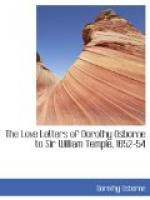INTRODUCTION
“An editor,” says Dr. Johnson, is “he that revises or prepares any work for publication;” and this definition of an editor’s duty seems wholly right and satisfactory. But now that the revision of these letters is apparently complete, the reader has some right to expect a formal introduction to a lady whose name he has, in all probability, never heard; and one may not be overstepping the modest and Johnsonian limits of an editor’s office, when the writing of a short introduction is included among the duties of preparation.
Dorothy Osborne was the wife of the famous Sir William Temple, and apology for her biography will be found in her own letters, here for the first time published. Some of them have indeed been printed in a Life of Sir William Temple by the Right Honourable Thomas Peregrine Courtenay, a man better known to the Tory politician of fifty years ago than to any world of letters in that day or this. Forty-two extracts from these letters did Courtenay transfer to an Appendix, without arrangement or any form of editing, as he candidly confesses; but not without misgivings as to how they would be received by a people thirsting to read the details of the negotiations which took place in connection with the Triple Alliance. If Courtenay lived to learn that the world had other things to do than pore over dull excerpts from inhuman State papers, we may pity his awakening; but we can never quite forgive the apologetic paragraph with which he relegates Dorothy Osborne’s letters to the mouldy obscurity of an Appendix.
When Macaulay was reviewing Courtenay’s book in the Edinburgh Review, he took occasion to write a short but living sketch of the early history of Sir William Temple and Dorothy Osborne. And with this account so admirably written, ready at hand, it becomes the clear duty of the Editor to quote rather than to rewrite; which he does with the greater pleasure, remembering that it was this very passage that first led him to read the letters of Dorothy Osborne.
“William Temple, Sir John’s eldest son, was born in London in the year 1628. He received his early education under his maternal uncle, was subsequently sent to school at Bishop-Stortford, and, at seventeen, began to reside at Emmanuel College, Cambridge, where the celebrated Cudworth was his tutor. The times were not favourable to study. The Civil War disturbed even the quiet cloisters and bowling-greens of Cambridge, produced violent revolutions in the government and discipline of the colleges, and unsettled the minds of the students. Temple forgot at Emmanuel all the little Greek which he had brought from Bishop-Stortford, and never retrieved the loss; a circumstance which would hardly be worth noticing but for the almost incredible fact, that fifty years later he was so absurd as to set up his own authority against that of Bentley on questions of Greek history and philology. He made no proficiency, either in the old philosophy which still lingered in the schools of Cambridge, or in the new philosophy of which Lord Bacon was the founder. But to the end of his life he continued to speak of the former with ignorant admiration, and of the latter with equally ignorant contempt.




